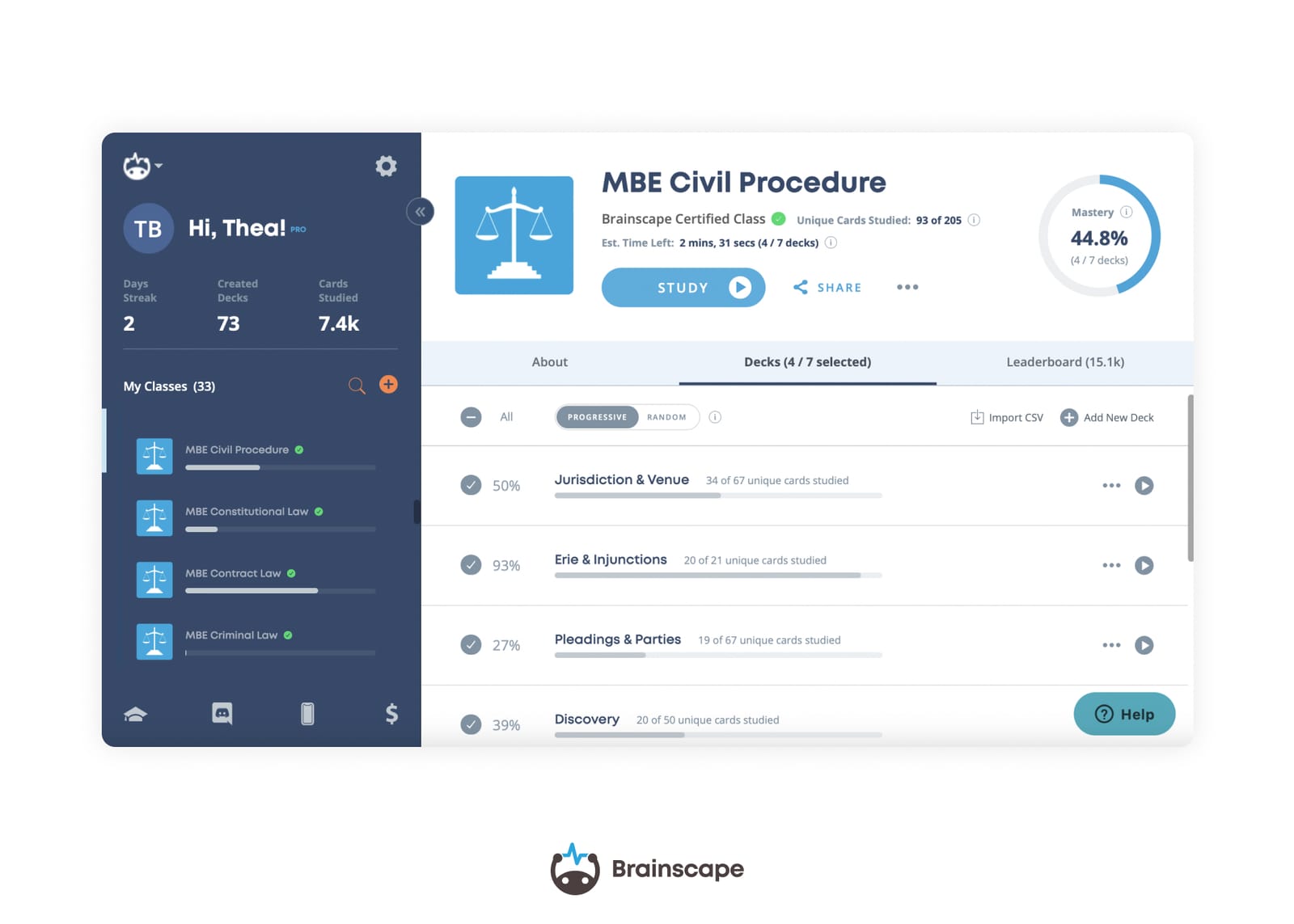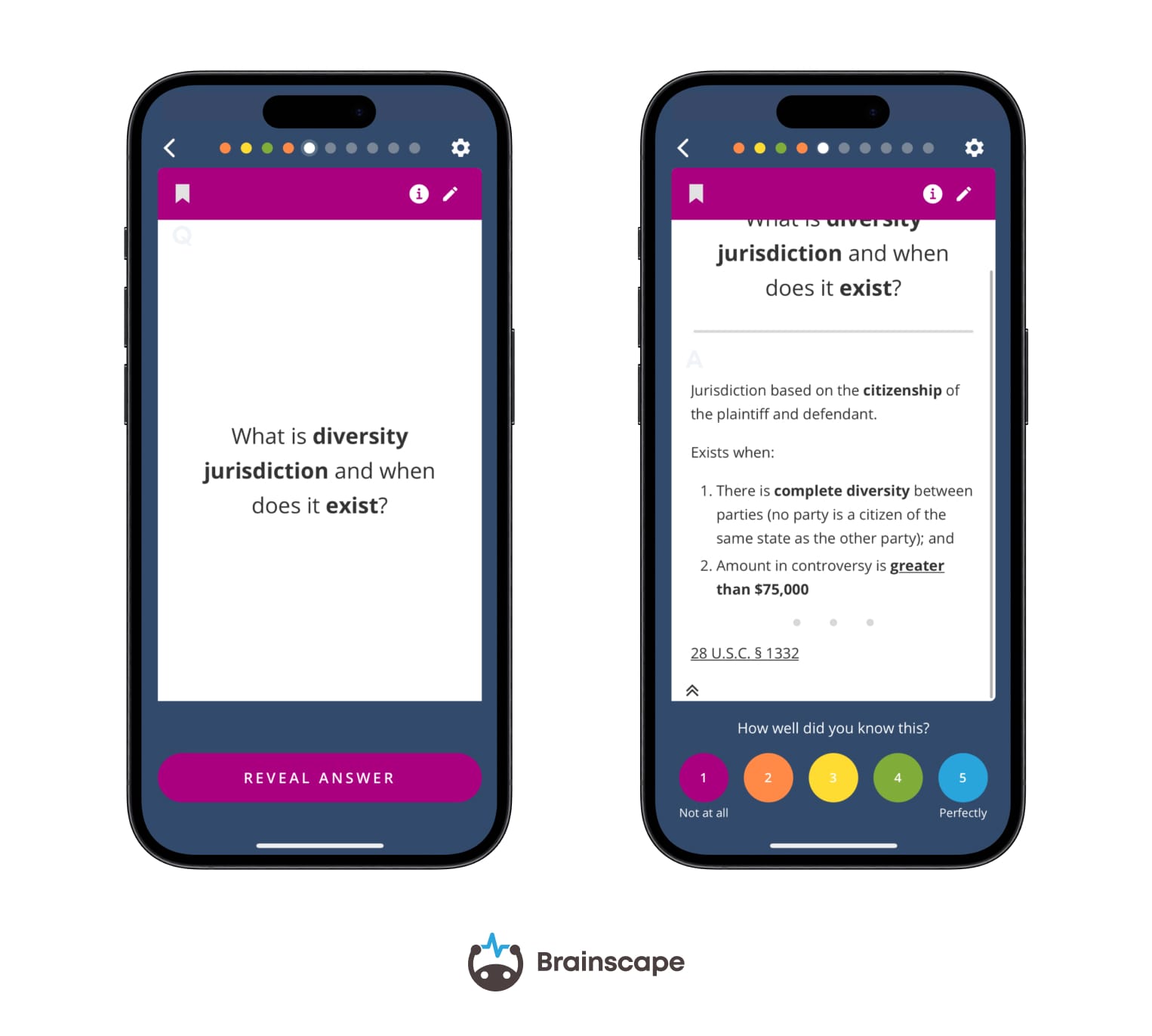You’ve made it through law school. You’re knee-deep in bar prep. Now it’s time to face your toughest opponent yet: the practice bar exam.
Don’t panic. Practice tests are your power tools. Not only do they prep your brain for the real thing, but they also build your stamina, help you identify weak spots, and teach you how to handle the pressure. Use these 23 tips to make every minute count.
General Tips For Bar Practice Exams
1. Take Practice Tests Early And Often
Don’t wait until you feel "ready" — you never will. Practice exams help you learn, not just measure what you know.
Take practice exams early and often. Use them to learn the law and what you need to improve on. Don’t wait until you feel ready—you never will!
2. Rest And Refresh Before Your Mock Exam
Eat well, sleep enough, and hydrate. Treat it like game day.
3. Chunk The Questions And Take Mini Breaks
The MBE is 6 hours, and depending on your state, the essays and other portions can be 1-2 additional days. It’s a mind-bending, exhausting affair. Even though practice exams have much lower stakes, they can still feel incredibly draining.
Split the MBE into 15-20 question segments. Rest between chunks to reset.
4. Track And Attack Your Weaknesses
We get better by identifying and attacking our weaknesses. The benefit of doing practice questions and exams isn’t just to practice taking the exam. It’s also to figure out where your weaknesses are and where you need to improve. If you’re like most students, you will repeat errors over and over again if you skip this step. This could mean the difference between passing and failing.
After each practice exam or question, understand precisely why you got the question wrong or why you missed points on an essay. Did you get it wrong because you didn’t know the law? Did you misread the question? Did you run out of time? Pay attention to patterns and correct them.
Use a spreadsheet to track errors (e.g., misread question, didn't know law). Then turn those errors into flashcards.
5. Be Kind To Yourself
We know—taking and scoring a practice exam can be demoralizing. But, don’t think of a practice exam necessarily as a test of your abilities, but an opportunity to learn—learn how the law is applied, what you know, what’s working for you, and what isn’t.
It often takes hundreds and hundreds of practice questions for students to see improvement. In fact, some students don’t see their MBE scores improve until right before the exam. If this is you, don’t panic. Just make sure that you are focusing on your areas of weakness and understanding why an answer is right or wrong.
Your score doesn’t define you. Use mistakes as learning fuel.
6. Use Real (Or Realistic) Questions
The NCBE (National Conference of Bar Examiners) writes and licenses all of the real MBE questions. Ideally, you’d use the real NCBE questions for your practice exams, but they can be somewhat hard (and expensive) to find. Most bar prep companies (with the exception of a few) write their own MBE questions. Sometimes they’re harder than actual MBE questions, and sometimes they’re easier.
If you decide to use non-NCBE questions, just make sure that you’re using a reputable bar prep company with realistic MBE questions.
7. Prioritize Explanations
You need to know why a question is right or wrong. If your practice questions don’t have explanations with them, they’re not useful to you. Don’t waste your time studying bar exam questions that don’t have explanations with the answers.
8. Simulate Exam Conditions
Silence. Paper. Pencil. Timer. No distractions. Build stamina gradually.
9. Master Your Pacing
To do the 100 questions in 3 hours, you need to be doing each question in an average of 1 minute and 48 seconds. You’ll be slower at first, and that’s fine. But part of doing your practice study questions is practicing your speed. Build up to getting through them quickly.
Shoot for 1.8 minutes per MBE question. Speed comes with practice.
10. Skip, Then Return
One way to pace yourself is to know when to skip a question and come back to it. Try to answer the question first, but don't get stuck on it. If it takes longer than a minute, skip it and move on.
11. Try Categorizing By Subject
This strategy may not be for everyone, but it’s been incredibly helpful for some of our students. The idea is that you first read all of the bar exam questions and categorize them into their law subjects. Maybe you write a “C” beside the contract questions, “CL” for the criminal law questions, and so on.
Group similar questions to reduce mental switching costs. Experiment with different orders of answering questions to find out what works for you.
12. Read The Question First
Some tutors suggest reading the call of the question first and then the answer choices before reading the fact pattern. This may help you to put the fact pattern into context.
13. Learn From Mistakes AND Guesses
Even if you guessed correctly, double-check why. Turn uncertainties into flashcards.
Wait, Did You Say Flashcards for Bar Exam Prep?
Here is one of the biggest mistakes that people make: they practice what they already know. Why? Because it feels good. Studying for a practice bar exam is a stressful and uncomfortable process. Studying what you know gives a false sense of security.
But it doesn’t help you in the long run. Don’t be like everyone else; focus your studying on what you don’t know.
Digital flashcard apps like Brainscape or Anki make this easy. They're coded with algorithms that automate spaced repetition in a way that adapts to your unique pace of learning. The result? You memorize legal information TWICE as efficiently as any other study technique.

The impact of digital flashcard apps like Brainscape or Quizlet cannot be overstated. One study of legal students found that digital flashcard apps increase satisfaction and motivation, while another saw a 19% increase in bar exam pass rates from students who used spaced repetition.
Glad we cleared that up! Back to the tips!
How to Study for the Bar Exam with Flashcards
14. Rate Your Confidence
Use your digital flashcard app's feedback system to rate your confidence. For example, Brainscape’s 1–5 scale lets you demonstrate how well you know an answer. By improving your awareness of how well you know a fact, you deepen your memory trace.

15. Actively Engage With Answer Explanations
When we say “review” the answers, we don’t just mean read them. We mean engage with them actively. It’s really easy when we’re reading to drift off and stop paying attention. Reading isn’t enough.
Paraphrase them, explain why other options were wrong, and make new flashcards.
How to Practice for the MEE (Essay Portion)
16. Focus on High-Yield Subjects and Rules
Some areas of law and legal rules are more highly tested than others. To do well on the essays, learn what these rules are and focus your study on them.
For example, the following areas of law are fair game on the MEE that many states use:
- Agency
- Partnerships
- Corporations and limited liability companies
- Civil procedure
- Conflict of laws
- Constitutional law
- Contracts
- Criminal law and procedure
- Evidence
- Family law
- Real property
- Secured transactions
- Torts
- Trusts and future interests
- Wills and estates
However, these topics usually make up the majority of the MEE:
- Civil procedure
- Contracts
- Corporations and LLCs
- Family law and trusts
- Future interests
Knowing that, focus on these topics more than the others. Make sure that you can crush them.
17. Start Essays Early
Just like with the MBE, don’t wait until you feel comfortable with the material before writing practice essays. Most students don’t start actually memorizing the essay portions until the end of June or July. This is a mistake.
As soon as you finish a topic or lecture, try writing a practice essay on that topic. Often, synthesizing your thoughts on paper is one of the key ways students learn the law and consolidate it.
Use open-book for the first few weeks. Then switch to closed-book. Don’t wait.
18. Use Bullet Outlines First
This is essential. For every essay, you want to write out the bullet points of the main arguments you would make to respond to the fact pattern. This is essentially a detailed outline, clearly identifying the logic in your answer and the important pieces of relevant law.
Practice structuring your argument with IRAC before writing full essays.
19. Don’t Write Out Every Essay
While you want to practice writing out the essays in full, you’ll waste time if you do this for every one. Instead, we suggest that for the majority of the prompts, you simply lay out the bulleted structure that you would use to write the essay (as above).
Outline most, write out every few. Save time while building skills.
20. Make It Easy For Graders
Make things easy for your grader: keep it organized. This means structuring and formatting your essay in a clear way. You can do this by:
- Using paragraph breaks to break up your work, especially between the issue, rule, analysis, and application. You could even use headings to make these clear.
- Writing what they’re expecting. For example, when you’re talking about the insanity defense, don’t just describe the test, but actually use the words “M’Naghten test”. Using appropriate keywords will help your grader to give you the marks you deserve.
- Emphasize keywords. Graders get tired too, and often they end up scanning essays instead of fully reading them. Write for scanners by underlining or bolding keywords (if your exam software allows).
21. Flashcards For Consistent Essay Errors
Use the model essays to check your answer. Like the MBE questions, you should take note of your mistake patterns in your essays. Then, make sure you’re practicing your weaknesses.
Making flashcards can help with this since they are an effective way to learn content over the long term. You can make flashcards on the law that you don’t know well enough. For example, for joint tortfeasor questions, you can make flashcards that include each of “joint and several liability”, “joint liability,” and “several liability” and the differences between them.

22. Flashcards For Essay Strategies
Build cards for essay approaches: e.g., "Steps for analyzing a Wills & Trusts intestacy prompt."
23. Time Yourself
As with the MBE, make sure you take your essay test under timed conditions that match the test you will be taking. The MEE has 6 essays to write in 3 hours, giving you 30 minutes for each of them. In California, there are 5 essays, and you get an hour to write each of them.
Ensure you understand what your state’s bar exam essays will be like and match your timing to that.
FAQ: How To Take A Practice Bar Exam
How Many Practice Questions Should You Do For The Bar?
Most successful bar takers complete several thousand MBE practice questions during their prep. Aim for at least 2,000 to 3,000 questions over the course of your study period, focusing on accuracy, explanation review, and identifying weak spots.
How Do You Memorize For The Bar Exam?
Effective bar exam memorization involves active recall, spaced repetition, and consistent review. Using tools like digital flashcards and teaching concepts aloud (like the Feynman technique) can help engrain knowledge deeply and efficiently.
What Is The Hardest Part Of The Bar Exam?
Many students find that managing the sheer volume of material across multiple subjects, combined with the pressure of time constraints, is the most difficult part. Others struggle with the essay portion, especially applying law to unfamiliar fact patterns under pressure.
Make Your Practice Exam Work For You
Practicing for the bar exam isn’t about being perfect. It’s about making steady progress, identifying your weaknesses, and turning those into strengths. That’s where digital flashcard apps like Brainscape and RemNote shine. They use active recall and spaced repetition to help you study smarter and faster.
Even if you only get 10-15 flashcards in between workouts or errands, that’s progress. With the right approach, the right mindset, and the right tools, you can walk into exam day confident and ready.
Additional Reading
- How to deal with bar exam stress
- How hard is the bar exam—and how can you make it easier?
- The best bar exam apps for law students
References
Bingol, M. (2025). The Impact of Using Virtual Vocabulary Learning Applications on Enhancing Law Students’ Lexical Competence at the Tertiary Level. https://doi.org/10.31235/osf.io/eg34x
Butterfield, B., & Metcalfe, J (2006). The correction of errors committed with high confidence. Metacognition and Learning, 1(1), 69-84.
Colbran, S., Gilding, A., & Colbran, S. (2014). The role of digital flashcards in legal education: theory and potential. European Journal of Law and Technology, 5(1).
Kang, S. H. (2016). Spaced repetition promotes efficient and effective learning. Policy Insights from the Behavioral and Brain Sciences, 3(1), 12–19. https://doi.org/10.1177/2372732215624708
Karpicke, J. D. (2012). Retrieval-based learning: Active retrieval promotes meaningful learning. Current Directions in Psychological Science, 21(3), 157-163.
Teninbaum, G. H. (2017). Spaced repetition: A method for learning more law in less time. Journal of High Technology Law, 17, 273.
